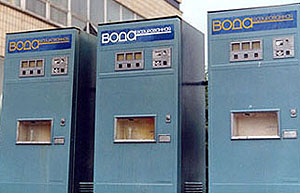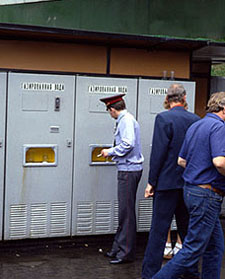
Pepsi was one of the first "Western" companies to establish a presence in the Soviet Union in the 1980s--probably a sign of the beginning of the end--The main problem for companies wishing to do business with Russia back then was the fact that the Russian ruble was not a convertible currency. These little kiosk stands were everywhere in Moscow when I was there in 1990.
Although I am far from being a big fan of Pepsi (I did learn to use Pepsi as a kind of universal mixer with "beverages" while I was in Russia.), nevertheless, Pepsi was a definite improvement over the "gassed Water" machines common in Russia.

Let me explain how these things worked. The machines worked on the same principle as the coffee vending machines that you can find in the United States. In the United States, you put your money in, make a selection, then a small paper cup drops into the slot and fills with coffee. You remove the cup and drink your coffee. The difference in these "gassed water" machines was first, that instead of coffee you were getting a kind of Sprite, or 7-Up, flavored carbonated water/soda, not necessarily cold either--Hey, it didn't taste too bad. Second, the cup was not a disposable, paper cup but a reusable plastic cup. You put it upside down in the slot and pressed a button to rinse out the cup. Then you righted the cup and filled it with the soda. When you were done, you put the cup back for the next person to use. Tatyana * has sent an image of a "new style" machine that she found is St. Petersburg in 2013.

![]()
What you must do in this unit
- Review the textbook chapter 42.
- Check the remarks by Professor Evans on A New Russian Culture.
- Study the Questions to Consider and the Key Terms for the Unit.
SUBMIT
- Submit the required Reflective paragraph (20 points).
- Post in the Canvas discussion forum (5 points Blackboard posting) a comment on what you found most interesting about your study of history in HIS 242 and include a suggestion for improving the course. Suggestions are very valuable as we are always making revisions to the course.
- IMPORTANT, as we come to the end of the course: To earn a grade of A, B, C or D, you must complete all required assignments, including the group project, and the two exams and earn the required number of points in the course.
What you can do in this unit
- With the end of our study of Russian history, Professor Blois has provided some classic samples of Soviet humor.
Some videos that you can watch for this unit
- Solzhenitsyn's Harvard Address
- Empire - Towards a post post-Cold War Era - Interview: Vladimir Voinovich
- For extra credit please suggest to your instructor a relevant video for this unit of the course. Send the title of the video, the URL and a brief explanation of why you find the video interesting and applicable to the material that is being studied in this unit.
Extra Credit Options
- For up to 25 points of extra credit, watch Vor (The Thief) and explain, in a one-page paper, what was so shocking about this film for Russian audiences.
- For up to 25 points of extra credit, watch Kavkazsky Plennik (Prisoner of the Mountains) about the conflict in Chechnya and write a short assessment of the movie, in a one-page paper.
- For up to 25 points of extra credit, read Boris Yeltsin (1931-), The Struggle for Russia (1994) and write a one-page paper explaining his political ideas.
- For up to 25 points of extra credit, read David Remnick, Lenin's Tomb: The Last Days of the Soviet Empire (1993) and write a one-page paper in which you explain the author's analysis of why the Soviet Union crumbled.
- For up to 25 points of extra credit, read Vasilii Aksenov, Generations of Winter (1994) and write a one-page paper assessing the author's ideas.
- For up to 25 points of extra credit, read Vesselin Nedkov, 57 Hours, A Survivor's Account of the Moscow Hostage Drama (2003) and write a one-page paper in which you explain what went wrong.
Unit Learning Objectives
- Upon successful completion of this unit and with the completion of your reflective paragraph, you will have demonstrated your mastery of the course goals and objectives, which are
- Establish a chronology of historical events in Russia since 1900.
- Obtain a knowledge of the historical geography of Russia since 1900.
- Define the importance of key individuals and developments in Russian history since 1900.
- Identify the social, economic and political forces at work in the historical development of late imperial, Soviet and post-Soviet Russia.
- Recognize and describe the significance of some of the cultural achievements of late imperial, Soviet and post-Soviet Russia.
- Analyze complex Russian historical sources and materials and reach conclusions based on interpretations of those materials.